Unit 3 Could you please tell me where the restrooms are Section B 2a-2d教学课件(共33张PPT,内嵌视频)人教版九年级全册
文档属性
| 名称 | Unit 3 Could you please tell me where the restrooms are Section B 2a-2d教学课件(共33张PPT,内嵌视频)人教版九年级全册 |
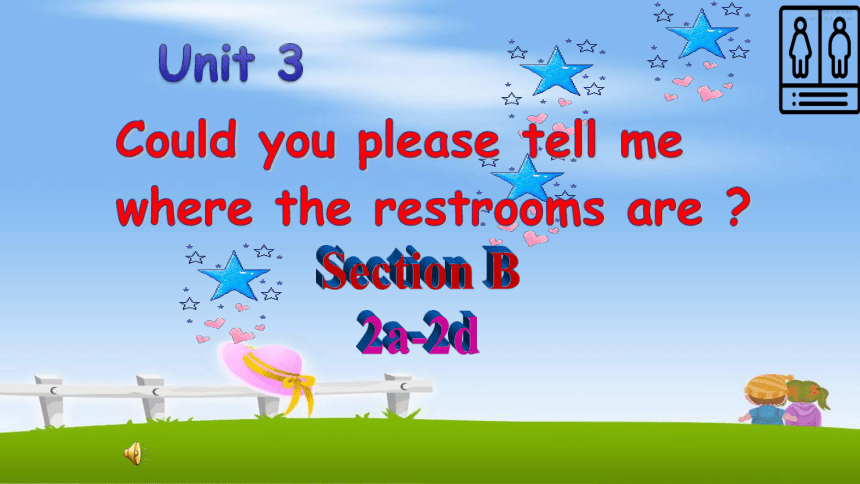
|
|
| 格式 | pptx | ||
| 文件大小 | 35.4MB | ||
| 资源类型 | 教案 | ||
| 版本资源 | 人教新目标(Go for it)版 | ||
| 科目 | 英语 | ||
| 更新时间 | 2024-09-05 11:54:16 | ||
图片预览

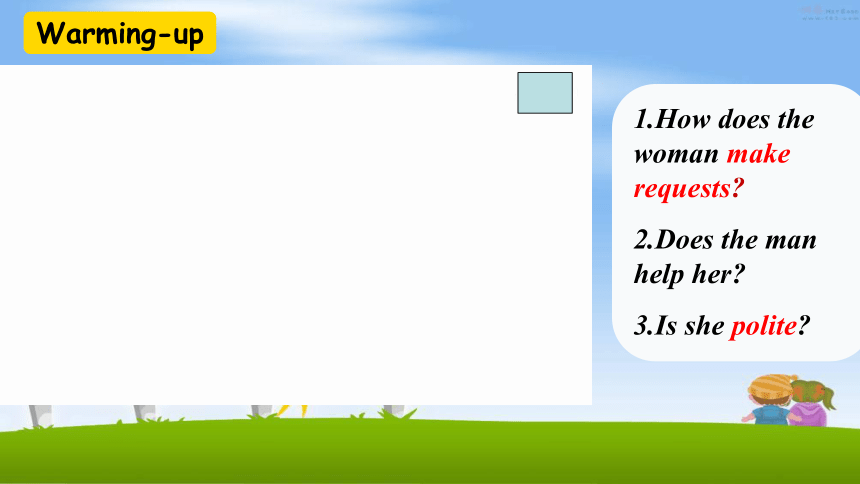
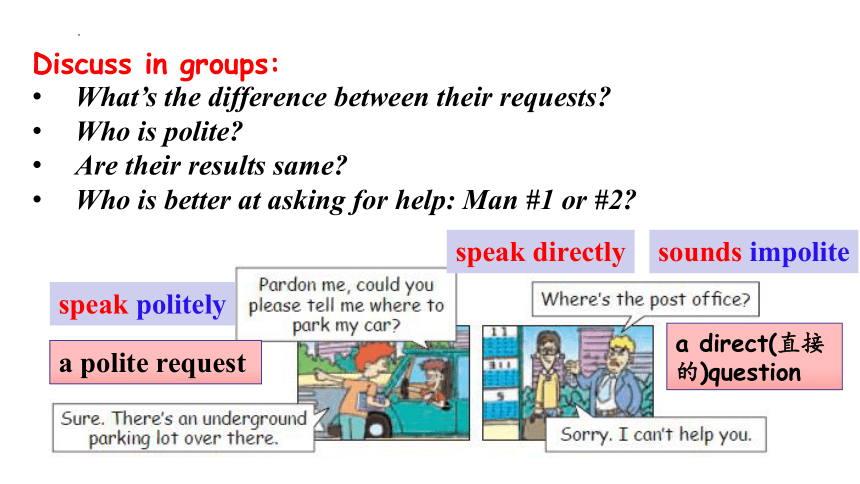
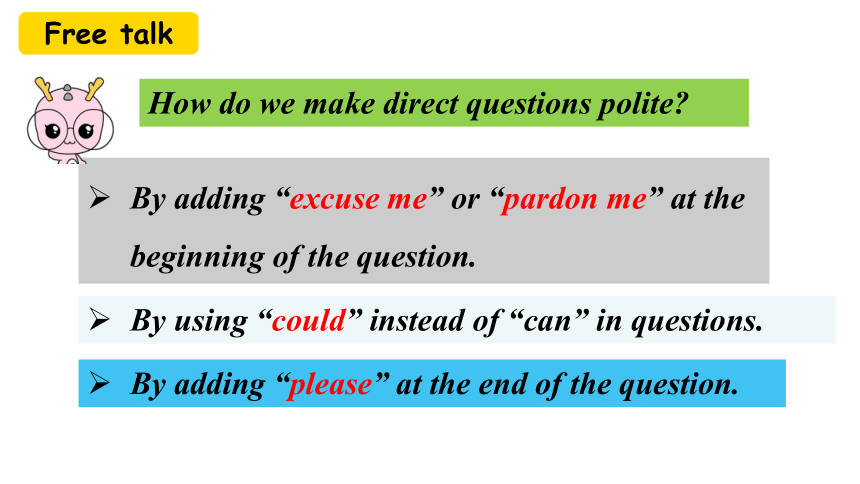
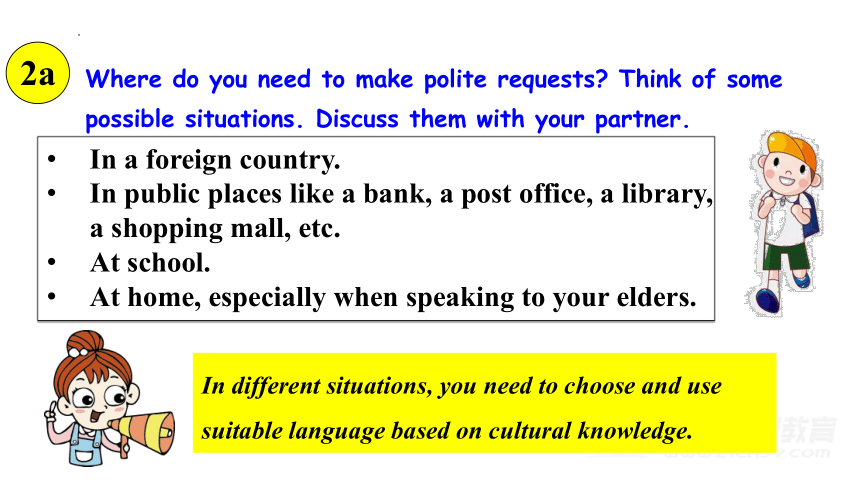
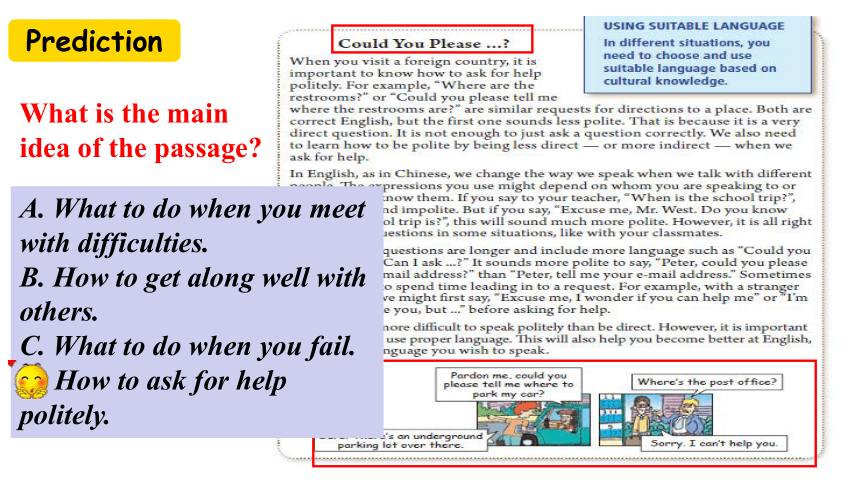
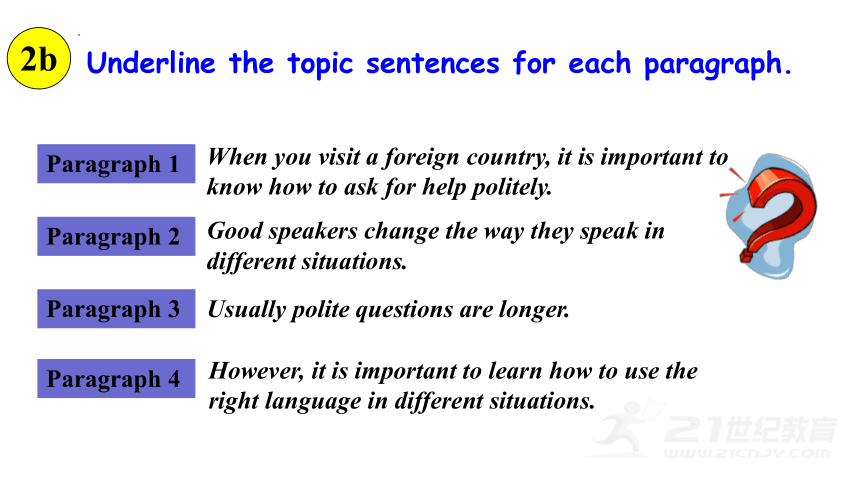
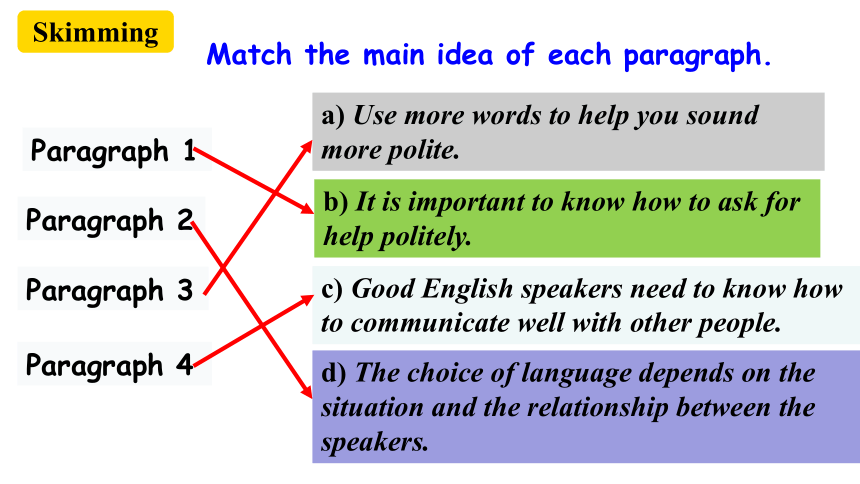
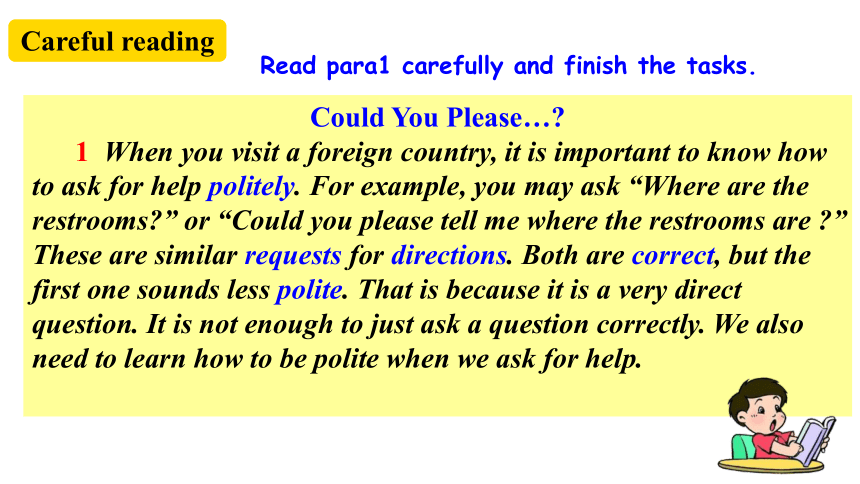
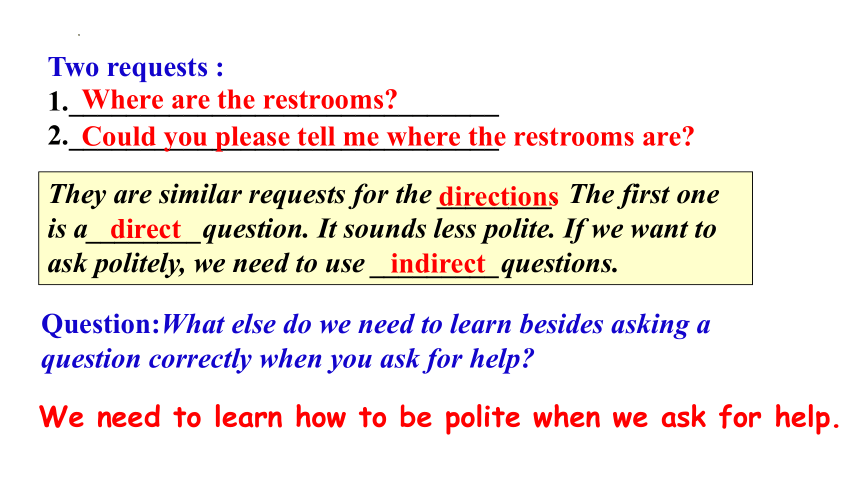
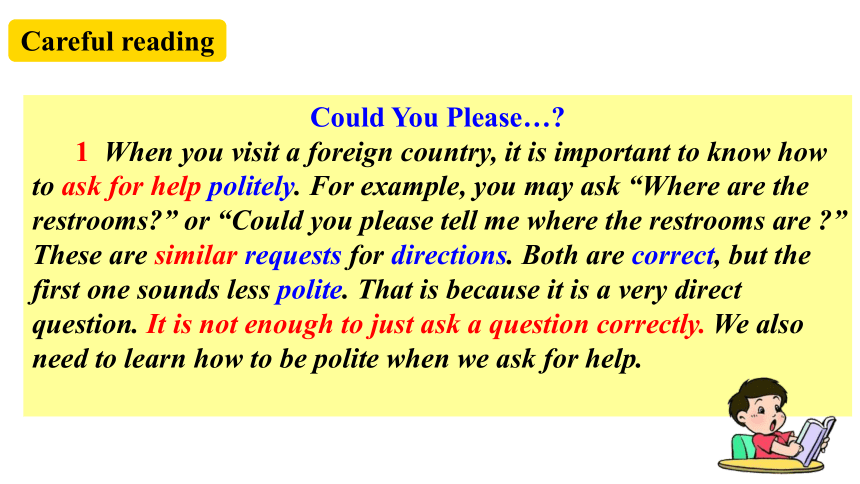
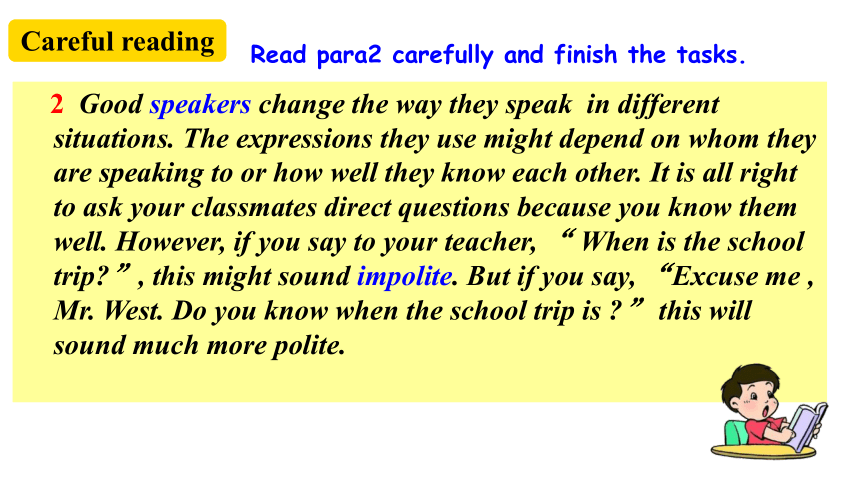
文档简介
(共33张PPT)
Section B
2a-2d
Unit 3
Could you please tell me
where the restrooms are
输入你的标题
Warming-up
1.How does the woman make requests
2.Does the man help her
3.Is she polite
Discuss in groups:
What’s the difference between their requests
Who is polite
Are their results same
Who is better at asking for help: Man #1 or #2
a direct(直接的)question
a polite request
sounds impolite
speak politely
speak directly
How do we make direct questions polite
By adding “excuse me” or “pardon me” at the beginning of the question.
By using “could” instead of “can” in questions.
By adding “please” at the end of the question.
Free talk
2a
Where do you need to make polite requests Think of some possible situations. Discuss them with your partner.
In a foreign country.
In public places like a bank, a post office, a library, a shopping mall, etc.
At school.
At home, especially when speaking to your elders.
In different situations, you need to choose and use suitable language based on cultural knowledge.
What is the main idea of the passage
A. What to do when you meet with difficulties.
B. How to get along well with others.
C. What to do when you fail.
D. How to ask for help politely.
Prediction
2b
Underline the topic sentences for each paragraph.
When you visit a foreign country, it is important to know how to ask for help politely.
Paragraph 1
Paragraph 2
Good speakers change the way they speak in different situations.
Paragraph 3
Usually polite questions are longer.
However, it is important to learn how to use the right language in different situations.
Paragraph 4
Match the main idea of each paragraph.
Paragraph 1
Paragraph 2
Paragraph 3
Paragraph 4
a) Use more words to help you sound more polite.
b) It is important to know how to ask for help politely.
c) Good English speakers need to know how to communicate well with other people.
d) The choice of language depends on the situation and the relationship between the speakers.
Skimming
Could You Please…
1 When you visit a foreign country, it is important to know how to ask for help politely. For example, you may ask “Where are the restrooms ” or “Could you please tell me where the restrooms are ” These are similar requests for directions. Both are correct, but the first one sounds less polite. That is because it is a very direct question. It is not enough to just ask a question correctly. We also need to learn how to be polite when we ask for help.
Read para1 carefully and finish the tasks.
Careful reading
Two requests :
1.______________________________
2.______________________________
Where are the restrooms
Could you please tell me where the restrooms are
They are similar requests for the ________. The first one is a________question. It sounds less polite. If we want to ask politely, we need to use _________questions.
directions
direct
indirect
Question:What else do we need to learn besides asking a question correctly when you ask for help
We need to learn how to be polite when we ask for help.
Could You Please…
1 When you visit a foreign country, it is important to know how to ask for help politely. For example, you may ask “Where are the restrooms ” or “Could you please tell me where the restrooms are ” These are similar requests for directions. Both are correct, but the first one sounds less polite. That is because it is a very direct question. It is not enough to just ask a question correctly. We also need to learn how to be polite when we ask for help.
Careful reading
2 Good speakers change the way they speak in different situations. The expressions they use might depend on whom they are speaking to or how well they know each other. It is all right to ask your classmates direct questions because you know them well. However, if you say to your teacher, “ When is the school trip ”, this might sound impolite. But if you say, “Excuse me , Mr. West. Do you know when the school trip is ” this will sound much more polite.
Read para2 carefully and finish the tasks.
Careful reading
Check “True” or “False”.
1. It is necessary to ask indirect questions to all the people around us.
2. We can ask direct questions to our classmates or friends.
3. We should ask indirect questions to our teachers or a stranger. It will be more polite.
4.The expressions you use might depend on whom you are speaking to or how well you know them.
F
T
T
T
2 Good speakers change the way they speak in different situations. The expressions they use might depend on whom they are speaking to or how well they know each other. It is all right to ask your classmates direct questions because you know them well. However, if you say to your teacher, “ When is the school trip ”, this might sound impolite. But if you say, “Excuse me , Mr. West. Do you know when the school trip is ” this will sound much more polite.
Careful reading
Answer the questions.
1.Do good speakers have the same way when they speak in different situations
2.What might the expressions depend on when you talk to different people
3.What do we need to think about when you talk to different people
The expressions we use might depend on whom we are speaking to or how well we know each other.
No, they should change the way.
We need to think about whom we speak to or how well we know them.
3 Usually polite questions are longer. They included expressions such as “Could you please… ”or “ May I ask… ” It sounds more polite to say, “Peter, could you please tell me your e-mail address ” than “Peter, tell me your e-mail address”. Sometimes we even need to spend time leading in to a request. For example, we might first say to a stranger, “Excuse me, I wonder if you can help me” or “ I’m sorry to trouble you, but…” before asking for help.
Read para3 carefully and finish the tasks.
Careful reading
Check “True” or “False”.
1.Usually polite questions are longer than impolite questions.
2.“Peter , tell me your e-mail address.” is a polite request.
3.Before asking for help to a stranger, you should say “Sorry, I wonder if you can help me.”
4.We don’t need time to lead in to a request sometimes.
T
F
T
F
Question:What can lead in to a request with a stranger on the street
“Excuse me, I wonder if you can help me” or “I’m sorry to trouble you, but …” before asking for help.
3 Usually polite questions are longer. They included expressions such as “Could you please… ”or “ May I ask… ” It sounds more polite to say, “Peter, could you please tell me your e-mail address ” than “Peter, tell me your e-mail address”. Sometimes we even need to spend time leading in to a request. For example, we might first say to a stranger, “Excuse me, I wonder if you can help me” or “ I’m sorry to trouble you, but…” before asking for help.
Careful reading
4 It might seem more difficult to speak politely than directly. However, it is important to learn how to use the right language in different situations. This will help you communicate better with other people.
Read para4 carefully and finish the tasks.
1.In the sentence,“This will help you communicate better with other people.”,What does “this” refer to
2.Why is it important to learn how to use the right language in different situations
To learn how to use the right language in different situations.
Because this will help you communicate better with other people.
Careful reading
Direct questions Polite requests
Where are
the restrooms
1. Could you please tell me where the restrooms are
2c
Find all the direct questions and polite requests from the passage.
Direct questions Polite requests
2. When is the
school trip
3. Peter, tell me
your e-mail address.
2. Excuse me, Mr. West. Do you know when the school trip is
3. Peter, could you please tell me
your e-mail address
4. Where’s the
post office
4. Pardon me, could you please tell me where to park my car
2d
Read the requests below. In the second column, write A if you would say it to someone you know and B if you would say it to a stranger. In the last column, write where you think these people are.
Request Person Place
1. Will you pass the salt
2. Do you know where I can change some money, please
3. Could you tell me what just happened
A
home
B
street
A/B
any public place/home
Read the request below. In the second column, write A if you would say it to someone you know and B if you would say it to a stranger. In the last column, write where you think these people are.
Request Person Place
4. Can you please tell me where the nearest station is
5. Excuse me, do you know what time it begins, please
6. Let me know when you’re ready, OK
7. Could you possibly tell me the way to the village school
B
street
B
movie theater
A
home
B
street
1. 提出礼貌的要求
2. 听起来更礼貌
3. 一个很直接的问题
4. 请求帮助
5. 在不同的情形下
6. 取决于
7. 你所用的表达方式
8. 比如
9. 花时间导入
10. 变得更擅长
make polite requests
sound more polite
in different situations
ask for help
a very direct question
become better at
spend time leading in
such as
the expressions you use
depend on
Phrases summary
Could you please tell me…
direct questions
polite questions
Where are…
make requests
When is …
teachers
People you know them well
/old people
/strangers
Excuse me, Mr West. Do you know…
features
Could you please ...
May I ask...?
Excuse me, I wonder if you can help me...
I’m sorry to trouble you, but...
longer
to whom
to whom
examples
examples
It’s very important to learn how to use the _______language in _______ situations.
right
different
Summary
how
why
Main idea
to be polite
to be polite
Let’s make a beautiful tree together.
suitable
language
How
Why
paragraph1-3
paragraph4
Summary
how
why
suitable
language
Knowing…important.
A way depends on…
Using extra…
Learning how to use…can help you communicate better…,
Retell the passage
我的收获
Words:(词)
Reading skill(阅读技巧)
Sentences(句)
复习速读与细读两种不同的阅读策略。
ask for, lend, park, direct, order, wonder, lead, trouble, offend, certain, structure, hand in, make requests, depend on, on the other hand, in a way.
1. When you visit a foreign country, it is important to know how to ask for help politely.
2. We need to learn how to be polite when we ask for help.
3. The expressions they use might depend on whom they are speaking to or how well they know each other.
4. Sometimes we even need to spend time leading in to a request.
We should be polite. Let’s start with making polite requests !
Politeness does no harm to people.
See people give a gift and walk ten miles less.
Good words are warm in winter, bad words are cold
in March.
讲礼貌对人并无损害。
见人施一礼,少走十里路。
Proverbs about Politeness
好言一句三冬暖,恶语伤人三月寒。
Wish you a better man!Wish you a better man!
I. 根据句意及汉语提示,填写单词。
You can find the ________ (地址) outside of the house.
2. I need a _____ (直截了当的)answer to
this question.
3. It is important to know how to ask for help _________(礼貌地).
4. I _______ (想知道) if Mr. Green will go
swimming with us tomorrow.
5. I’m not sure of the ________ (正确的) spelling.
direct
wonder
address
politely
correct
Exercises
Thank you
Section B
2a-2d
Unit 3
Could you please tell me
where the restrooms are
输入你的标题
Warming-up
1.How does the woman make requests
2.Does the man help her
3.Is she polite
Discuss in groups:
What’s the difference between their requests
Who is polite
Are their results same
Who is better at asking for help: Man #1 or #2
a direct(直接的)question
a polite request
sounds impolite
speak politely
speak directly
How do we make direct questions polite
By adding “excuse me” or “pardon me” at the beginning of the question.
By using “could” instead of “can” in questions.
By adding “please” at the end of the question.
Free talk
2a
Where do you need to make polite requests Think of some possible situations. Discuss them with your partner.
In a foreign country.
In public places like a bank, a post office, a library, a shopping mall, etc.
At school.
At home, especially when speaking to your elders.
In different situations, you need to choose and use suitable language based on cultural knowledge.
What is the main idea of the passage
A. What to do when you meet with difficulties.
B. How to get along well with others.
C. What to do when you fail.
D. How to ask for help politely.
Prediction
2b
Underline the topic sentences for each paragraph.
When you visit a foreign country, it is important to know how to ask for help politely.
Paragraph 1
Paragraph 2
Good speakers change the way they speak in different situations.
Paragraph 3
Usually polite questions are longer.
However, it is important to learn how to use the right language in different situations.
Paragraph 4
Match the main idea of each paragraph.
Paragraph 1
Paragraph 2
Paragraph 3
Paragraph 4
a) Use more words to help you sound more polite.
b) It is important to know how to ask for help politely.
c) Good English speakers need to know how to communicate well with other people.
d) The choice of language depends on the situation and the relationship between the speakers.
Skimming
Could You Please…
1 When you visit a foreign country, it is important to know how to ask for help politely. For example, you may ask “Where are the restrooms ” or “Could you please tell me where the restrooms are ” These are similar requests for directions. Both are correct, but the first one sounds less polite. That is because it is a very direct question. It is not enough to just ask a question correctly. We also need to learn how to be polite when we ask for help.
Read para1 carefully and finish the tasks.
Careful reading
Two requests :
1.______________________________
2.______________________________
Where are the restrooms
Could you please tell me where the restrooms are
They are similar requests for the ________. The first one is a________question. It sounds less polite. If we want to ask politely, we need to use _________questions.
directions
direct
indirect
Question:What else do we need to learn besides asking a question correctly when you ask for help
We need to learn how to be polite when we ask for help.
Could You Please…
1 When you visit a foreign country, it is important to know how to ask for help politely. For example, you may ask “Where are the restrooms ” or “Could you please tell me where the restrooms are ” These are similar requests for directions. Both are correct, but the first one sounds less polite. That is because it is a very direct question. It is not enough to just ask a question correctly. We also need to learn how to be polite when we ask for help.
Careful reading
2 Good speakers change the way they speak in different situations. The expressions they use might depend on whom they are speaking to or how well they know each other. It is all right to ask your classmates direct questions because you know them well. However, if you say to your teacher, “ When is the school trip ”, this might sound impolite. But if you say, “Excuse me , Mr. West. Do you know when the school trip is ” this will sound much more polite.
Read para2 carefully and finish the tasks.
Careful reading
Check “True” or “False”.
1. It is necessary to ask indirect questions to all the people around us.
2. We can ask direct questions to our classmates or friends.
3. We should ask indirect questions to our teachers or a stranger. It will be more polite.
4.The expressions you use might depend on whom you are speaking to or how well you know them.
F
T
T
T
2 Good speakers change the way they speak in different situations. The expressions they use might depend on whom they are speaking to or how well they know each other. It is all right to ask your classmates direct questions because you know them well. However, if you say to your teacher, “ When is the school trip ”, this might sound impolite. But if you say, “Excuse me , Mr. West. Do you know when the school trip is ” this will sound much more polite.
Careful reading
Answer the questions.
1.Do good speakers have the same way when they speak in different situations
2.What might the expressions depend on when you talk to different people
3.What do we need to think about when you talk to different people
The expressions we use might depend on whom we are speaking to or how well we know each other.
No, they should change the way.
We need to think about whom we speak to or how well we know them.
3 Usually polite questions are longer. They included expressions such as “Could you please… ”or “ May I ask… ” It sounds more polite to say, “Peter, could you please tell me your e-mail address ” than “Peter, tell me your e-mail address”. Sometimes we even need to spend time leading in to a request. For example, we might first say to a stranger, “Excuse me, I wonder if you can help me” or “ I’m sorry to trouble you, but…” before asking for help.
Read para3 carefully and finish the tasks.
Careful reading
Check “True” or “False”.
1.Usually polite questions are longer than impolite questions.
2.“Peter , tell me your e-mail address.” is a polite request.
3.Before asking for help to a stranger, you should say “Sorry, I wonder if you can help me.”
4.We don’t need time to lead in to a request sometimes.
T
F
T
F
Question:What can lead in to a request with a stranger on the street
“Excuse me, I wonder if you can help me” or “I’m sorry to trouble you, but …” before asking for help.
3 Usually polite questions are longer. They included expressions such as “Could you please… ”or “ May I ask… ” It sounds more polite to say, “Peter, could you please tell me your e-mail address ” than “Peter, tell me your e-mail address”. Sometimes we even need to spend time leading in to a request. For example, we might first say to a stranger, “Excuse me, I wonder if you can help me” or “ I’m sorry to trouble you, but…” before asking for help.
Careful reading
4 It might seem more difficult to speak politely than directly. However, it is important to learn how to use the right language in different situations. This will help you communicate better with other people.
Read para4 carefully and finish the tasks.
1.In the sentence,“This will help you communicate better with other people.”,What does “this” refer to
2.Why is it important to learn how to use the right language in different situations
To learn how to use the right language in different situations.
Because this will help you communicate better with other people.
Careful reading
Direct questions Polite requests
Where are
the restrooms
1. Could you please tell me where the restrooms are
2c
Find all the direct questions and polite requests from the passage.
Direct questions Polite requests
2. When is the
school trip
3. Peter, tell me
your e-mail address.
2. Excuse me, Mr. West. Do you know when the school trip is
3. Peter, could you please tell me
your e-mail address
4. Where’s the
post office
4. Pardon me, could you please tell me where to park my car
2d
Read the requests below. In the second column, write A if you would say it to someone you know and B if you would say it to a stranger. In the last column, write where you think these people are.
Request Person Place
1. Will you pass the salt
2. Do you know where I can change some money, please
3. Could you tell me what just happened
A
home
B
street
A/B
any public place/home
Read the request below. In the second column, write A if you would say it to someone you know and B if you would say it to a stranger. In the last column, write where you think these people are.
Request Person Place
4. Can you please tell me where the nearest station is
5. Excuse me, do you know what time it begins, please
6. Let me know when you’re ready, OK
7. Could you possibly tell me the way to the village school
B
street
B
movie theater
A
home
B
street
1. 提出礼貌的要求
2. 听起来更礼貌
3. 一个很直接的问题
4. 请求帮助
5. 在不同的情形下
6. 取决于
7. 你所用的表达方式
8. 比如
9. 花时间导入
10. 变得更擅长
make polite requests
sound more polite
in different situations
ask for help
a very direct question
become better at
spend time leading in
such as
the expressions you use
depend on
Phrases summary
Could you please tell me…
direct questions
polite questions
Where are…
make requests
When is …
teachers
People you know them well
/old people
/strangers
Excuse me, Mr West. Do you know…
features
Could you please ...
May I ask...?
Excuse me, I wonder if you can help me...
I’m sorry to trouble you, but...
longer
to whom
to whom
examples
examples
It’s very important to learn how to use the _______language in _______ situations.
right
different
Summary
how
why
Main idea
to be polite
to be polite
Let’s make a beautiful tree together.
suitable
language
How
Why
paragraph1-3
paragraph4
Summary
how
why
suitable
language
Knowing…important.
A way depends on…
Using extra…
Learning how to use…can help you communicate better…,
Retell the passage
我的收获
Words:(词)
Reading skill(阅读技巧)
Sentences(句)
复习速读与细读两种不同的阅读策略。
ask for, lend, park, direct, order, wonder, lead, trouble, offend, certain, structure, hand in, make requests, depend on, on the other hand, in a way.
1. When you visit a foreign country, it is important to know how to ask for help politely.
2. We need to learn how to be polite when we ask for help.
3. The expressions they use might depend on whom they are speaking to or how well they know each other.
4. Sometimes we even need to spend time leading in to a request.
We should be polite. Let’s start with making polite requests !
Politeness does no harm to people.
See people give a gift and walk ten miles less.
Good words are warm in winter, bad words are cold
in March.
讲礼貌对人并无损害。
见人施一礼,少走十里路。
Proverbs about Politeness
好言一句三冬暖,恶语伤人三月寒。
Wish you a better man!Wish you a better man!
I. 根据句意及汉语提示,填写单词。
You can find the ________ (地址) outside of the house.
2. I need a _____ (直截了当的)answer to
this question.
3. It is important to know how to ask for help _________(礼貌地).
4. I _______ (想知道) if Mr. Green will go
swimming with us tomorrow.
5. I’m not sure of the ________ (正确的) spelling.
direct
wonder
address
politely
correct
Exercises
Thank you
同课章节目录
- Unit 1 How can we become good learners.
- Section A
- Section B
- Unit 2 I think that mooncakes are delicious!
- Section A
- Section B
- Unit 3 Could you please tell me where the restroom
- Section A
- Section B
- Unit 4 I used to be afraid of the dark.
- Section A
- Section B
- Unit 5 What are the shirts made of?
- Section A
- Section B
- Review of Units 1-5
- Unit 6 When was it invented?
- Section A
- Section B
- Unit 7 Teenagers should be allowed to choose their
- Section A
- Section B
- Unit 8 It must belong to Carla.
- Section A
- Section B
- Unit 9 I like music that I can dance to.
- Section A
- Section B
- Unit 10 You're supposed to shake hands.
- Section A
- Section B
- Review of Units 6-10
- Unit 11 Sad movies make me cry.
- Section A
- Section B
- Unit 12 Life is full of the unexpected
- Section A
- Section B
- Unit 13 We're trying to save the earth!
- Section A
- Section B
- Unit 14 I remember meeting all of you in Grade 7.
- Section A
- Section B
- Review of Units 11-14
